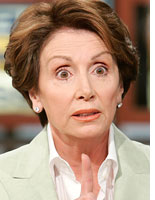So, Why is Cutting WV Taxes OK Despite the Multibillion Dollar Unfunded Liability?
 If you believe the somewhat less than luminary minds that occupy the Democratic leadership in the Legislature, West Virginia should not cut taxes until we've paid off the ~$5.5 billion (present value) unfunded liabilities of the state pension funds. This is the same cabal, mind you, that is simultaneously preparing to pass public employee pay raises and maybe other spending programs that will require higher state spending permanently.
If you believe the somewhat less than luminary minds that occupy the Democratic leadership in the Legislature, West Virginia should not cut taxes until we've paid off the ~$5.5 billion (present value) unfunded liabilities of the state pension funds. This is the same cabal, mind you, that is simultaneously preparing to pass public employee pay raises and maybe other spending programs that will require higher state spending permanently.
As a basic economic matter, the state has its debts under control and has kept to a 40-year plan adopted in 1994 that established a structured amortization of the billions of dollars by which promised pensions for state employees and public school teachers were underfunded. This plan provides for gradually increasing payments each year. Currently, the annual payment is just over $350 million; it will eventually rise to over $700 million by the end of the program. This was done in recognition of the fact that there will be gradual inflation and growth in state revenues. The current plan assumes an annual growth of about 3 percent in the required payment, which is approximately the current rate of inflation nationally. At this rate, a dollar today would be two dollars in 2034. For comparison, state revenues have tripled over the last 30 years. The thought of state revenues and spending tripling again over the next 30 years unsettles me a bit and probably does the same to you, but foregoing tax cuts only makes that part of our history more likely to repeat itself. While I obviously prefer that if the state must spend more money, the money should be spent on the pension debts and nonrecurring projects, foregoing tax cuts for the sake of accelerating the pension debt payoff just isn't necessary.
Now, for the political aspect of this dispute. As I said yesterday, the Democratic leadership says Yes to more spending and a decisive No to giving even a pittance of relief to those of us who pay the taxes that support our state government. If we send it, they'll spend it.
One of the areas in which the Democratic legislative leadership is considering new spending is public employee compensation. As I said yesterday, I don't object to this per se if it's done in a way that does not generate a new unfunded pension liability and conforms to realistic estimates of the state's future financial condition and ability to pay without raising taxes or taking other fiscally irresponsible moves. However, I expect that the people who pontificate about the need to pay off our debts before we cut taxes will be the same people who will grab their shovels and dig our hole a bit deeper. In fact, they already did so earlier this year when they enacted a bill to revert to a defined benefit pension system for public school teachers from the defined contribution plan that had been in operation since 1991. We cannot trust them, and for good reason. Here's a sample:
- Senate President Earl Ray Tomblin's family annually receives hundreds of thousands of dollars from the state Greyhound Breeders Development Fund for breeding greyhounds for Tri-State Racetrack & Gaming Center and has been the largest recipient of money from this fund for years.
- Tomblin's wife Joanne (who does not hold a doctoral degree) makes over $90,000 per year as the President of Southern West Virginia Community & Technical College, although even that is chump change compared to the fortune they made when they sold their video poker business to Delegate Joe C. Ferrell, who himself has quite a checkered past.
- Senate Majority Leader Truman Chafin has tried repeatedly to create a second Circuit Court judgeship in Mingo County to dilute the influence of the county's judge, a Chafin adversary, even though the county has no need for two judges and the state Supreme Court has the power to temporarily reassign other judges if the local judge is on vacation, must recuse himself from cases, or a case backlog develops (which has not happened but would make a case for a second judge should it ever happen).
 Disgraced former House Education Committee Chairman Jerry Mezzatesta illegally steered hundreds of thousands of dollars of education funds away from more deserving counties to his employer, Hampshire County schools, while collecting paychecks for both jobs simultaneously and despite an agreement with the Ethics Commission stipulating that he would not use his leadership position to steer money to his employer. Mezzatesta was formerly a $60,000 a year grant writer whose job description involved applying for federal and private grants; he wrote no grant applications in his five years in that position although he steered a lot of state funds.
Disgraced former House Education Committee Chairman Jerry Mezzatesta illegally steered hundreds of thousands of dollars of education funds away from more deserving counties to his employer, Hampshire County schools, while collecting paychecks for both jobs simultaneously and despite an agreement with the Ethics Commission stipulating that he would not use his leadership position to steer money to his employer. Mezzatesta was formerly a $60,000 a year grant writer whose job description involved applying for federal and private grants; he wrote no grant applications in his five years in that position although he steered a lot of state funds.- Attorney General Darrell McGraw spent hundreds of thousands of taxpayer dollars for "public service announcements" last fall that not so coincidentally heavily promoted the family name while he & his brother Warren were locked in tough reelection battles and did not stay on the air after Election Day; Darrell won an 8,000 vote squeaker but we defeated Brother Warren in the Supreme Court contest.
- Now since this posting isn't intended to be a Who's Who Among Self-Serving Back Room Power Brokers in West Virginia Politics, I will stop with that.
While most of the talk lately has centered on whether groceries should remain subject to the sales tax (the vast majority of states don't subject groceries to their sales taxes), it's got a lot of company among the taxes the Democratic legislative leadership flatly refuses to consider cutting. While I personally think there are other ways the state could cut taxes to have a more significant positive impact on the economy and/or reduce other inequities in our tax structure, most people view the effort to end the food tax as a moral issue and I tend to agree with that point. In recent years, Republican legislators have offered proposals for tax cuts in each of the following areas, all of which go to the Finance Committees to never see the light of day:
- Food tax
- Business Franchise Tax
- Corporate Income Tax (we're near the top at a flat 9%)
- Personal income tax personal exemption (we're one of few states where families below the poverty line have to pay state income taxes)
- Personal Income Tax marginal rates (our top rate of 6.5% is higher than every neighboring state but Ohio, whose recent tax cut legislation will change this)
- Personal Property Tax
- Motor Vehicle Privilege Tax (which taxes your vehicle at 5% every time it gets a new title unlike the sales tax, which only taxes items once when they're first sold)
The Republicans in the Legislature have bent over backwards to craft tax relief plans that would "be paid for" through future revenue growth by phasing in the proposed cuts. They've offered food tax repeal bills containing phase-out periods as long as 12 years and at other times offered bills that would automatically delay additional installments of proposed tax cuts if state revenues didn't grow by a specified minimum amount from year to year. I don't like the revenue trigger idea myself, but it was proposed in some versions of tax relief legislation to demonstrate the abundance of good faith the Republicans were showing toward the Democrats (whose days in the majority are now numbered with only 16 more months left in their control of the state Senate). The Democratic leadership's answer to the question of when will they support a meaningful tax cut is, "When Hell freezes over."
There's a trend here. The Democratic legislative leadership might vote pro-life and pro-gun owner, but they're not all-around conservatives. When it comes to taxes, there's no difference between the Democratic legislative leadership and the tax-and-spend liberals like Hillary Clinton, Howard Dean, and "San Fran Nan" Pelosi that run their party at the national level. They've never met a tax they didn't hike. I predict that we will join the 4 of 5 neighboring states (every neighboring state except Maryland) that have a Republican majority in the state Senate after the 2006 election and the House of Delegates will follow suit in 2008.






<< Home